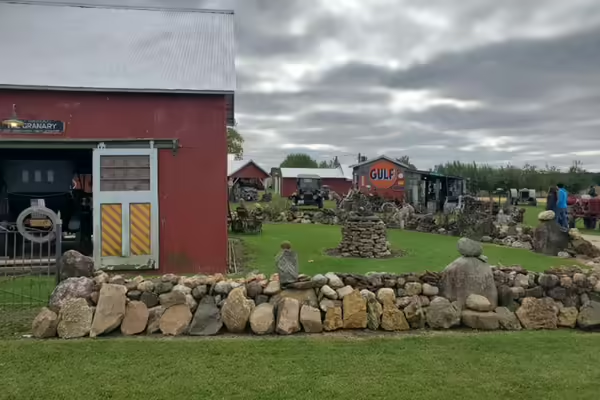
OREGON, Ill. - This year's Ogle County Farm Stroll will be on Sunday, October 13, 2024, from 11 a.m. to 4 p.m.
Here are a few Farm Stroll guidelines to make this an enjoyable event for you and your family. Dress appropriately for a farm visit. This event takes place rain or shine. Be sure to follow each farmer's instructions and be respectful of all the animals. Wash your hands regularly. Do not bring your pets for the safety of livestock and other participants. Pick up, complete, and turn in a Farm Stroll Passport at any of the farms for a chance to win prizes. Most importantly, be safe and have fun!
There is no beginning or end to the Farm Stroll. Choose which farms you want to see, gather your friends and family, and enjoy a relaxing, educational, and fun afternoon. Satisfy your local food cravings and curiosities.
Follow the Ogle County Farm Stroll on Facebook for information, brochures, maps, and spotlight features on each farm: https://www.facebook.com/northernilfarmstroll. Contact the Ogle County Extension office at 815-732-2191 with any additional questions or if you need reasonable accommodation to participate in this program. Event brochures can be picked up at the Ogle County Extension office at 421 W Pines Rd, Suite 10 in Oregon, during regular business hours of 8 a.m. to 4:30 p.m. or go to our website at https://extension.illinois.edu/bdo.
Participating farms:
Barnhart's Stone Corner - Oregon (in news story photo)
Jon and Cindy Barnhart collect and display antique farm equipment and a collection of historical oddities. In addition, they maintain a unique collection of hundreds of tons of stones, many marked with dates and points of origin, all arranged in stone fences and sculptures on their property.
BerryView Orchard - Mt. Morris
Jeff and Julie Warren are growing the super-fruit, aronia berries, using organic practices. Taste aronia berries, learn about the benefits, and find ways to add them to your cooking, baking, and juicing. Pick your own berries and apples, or purchase pre-picked ones. Sample jams, jellies, and cookies. Walk the orchards and see what's growing.
Dietrich Ranch - Mt. Morris
Animals are 100% grass-fed using intensive rotational grazing and holistic management. They raise 100% grass-fed/grass-finished Beef, Lamb, free-range pastured Chicken, and Pork. All of the products the farm offers are raised without chemicals, antibiotics, or hormones.
Happily Homegrown - Oregon
The Bruns family lives on a 12-acre homestead, growing and raising most of their food. This includes pigs, cows, rabbits, chickens, and various fruits and vegetables. How do they get through the winter? A greenhouse, of course!
Hough's Maple Lane Farm - Mt. Morris
Rob, Lynnette Hough, and their two children collect maple sap in the spring and boil it down into maple goodness using the family's sugar house. Each year, 20 to 30 gallons of maple syrup is made and sold. Other maple treats, including candy, cookies, granola, pickles, and dog treats, are also created.
Orion Organics - Franklin Grove
Tim Benedict's apiary and garlic farm is surrounded by thousands of acres of native prairie and woodlands. He adheres to strict organic farming methods to produce artisanal raw honey from the native prairie wildflowers among the Nachusa Grasslands.
University of Illinois Extension develops educational programs, extends knowledge, and builds partnerships to support people, communities, and their environments as part of the state's land-grant institution. Extension serves as the leading public outreach effort for University of Illinois Urbana-Champaign and the College of Agricultural, Consumer and Environmental Sciences in all 102 Illinois counties through a network of 27 multi-county units and over 700 staff statewide. Extension’s mission is responsive to eight strategic priorities — community, economy, environment, food and agriculture, health, partnerships, technology and discovery, and workforce excellence — that are served through six program areas — 4-H youth development, agriculture and agribusiness, community and economic development, family and consumer science, integrated health disparities, and natural resources, environment, and energy.